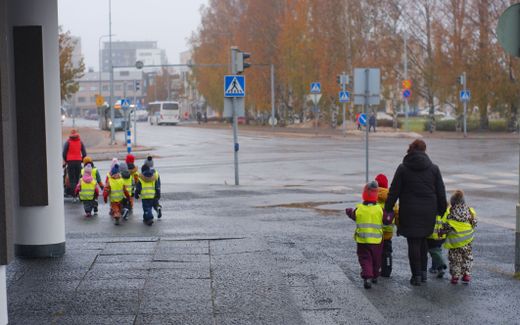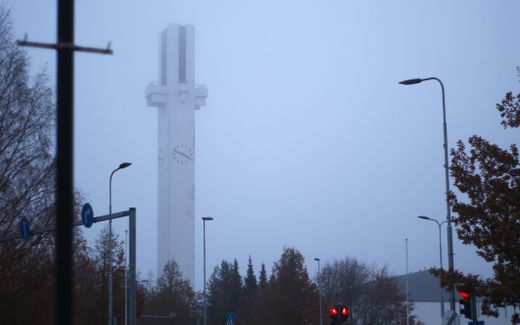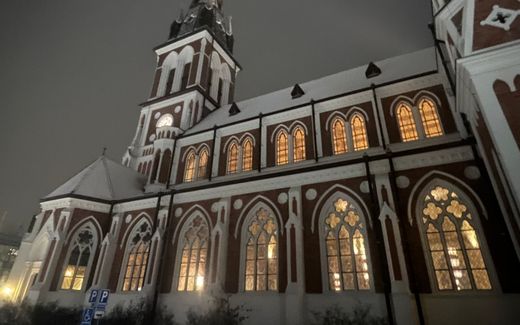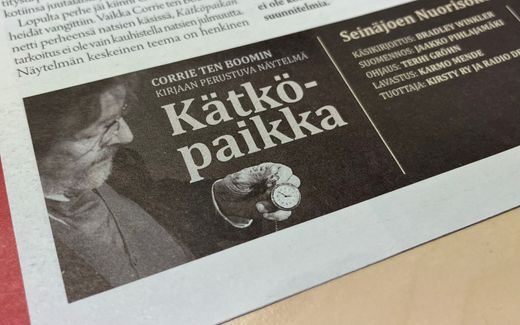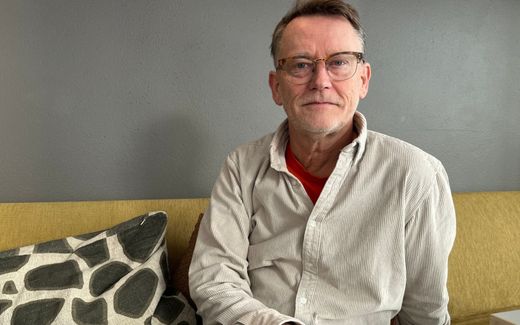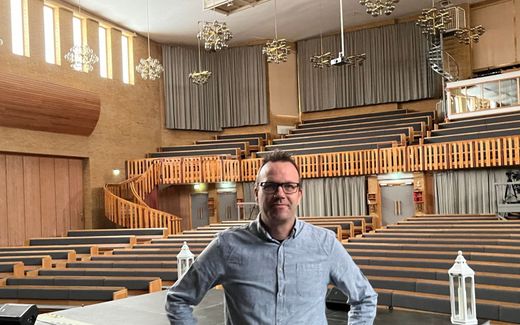Biblebelt feature: Gender thinking does not attract German on Biblebelt
27-02-2024
Central Europe
Addy de Jong, RD
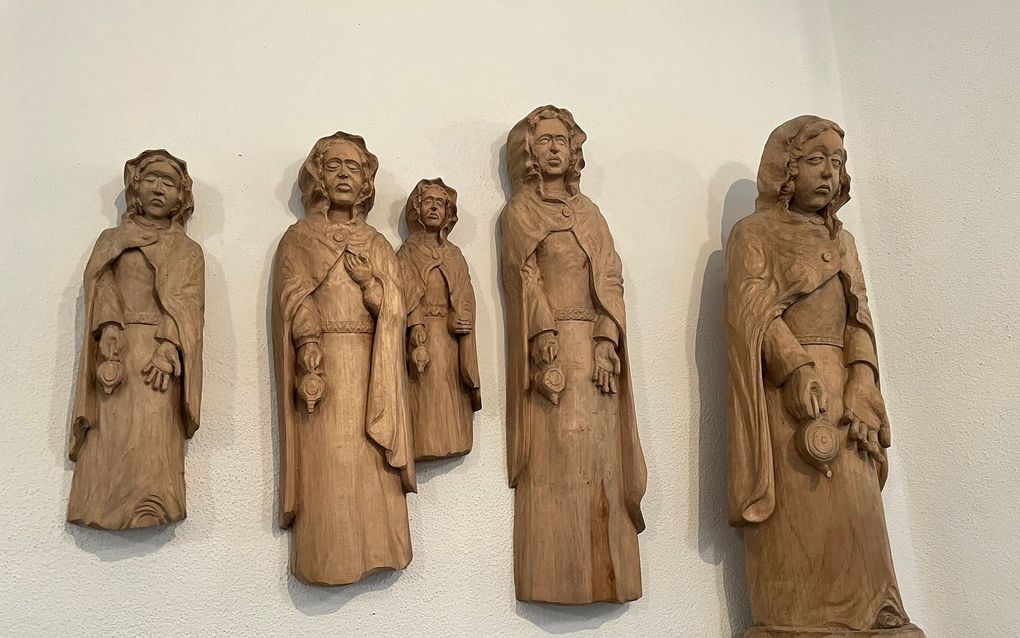
Artwork symbolising the five virgins from the parable in the Lutheran church of Thalheim. Photo RD, Addy de Jong
Central Europe
No crowds of churchgoers rush to the prayer houses on Sundays. Yet many in Germany recognise the image that the Vogtland and the Ore Mountains have something of a Biblebelt. "Modern ideas around gender definitely don't get a foothold here," he says.
There is a buzz of activity at the large Lutheran Church in Thalheim this Saturday evening in February. The gathering is to thank all the volunteers who did something for the church in the past year. There are tasty sandwiches, beer, and cabaret. There are prayers and singing. And what is striking: among the 150 or so attendees, there are also many young people and children in addition to the elderly.
It is, therefore, not so strange, says Simone Lehmann, one of the organisers, that the Erzgebirge (Ore Mountains) is known as a kind of Biblebelt. "Compared to other parts of Germany, people's commitment to the church is still high here."
Pietistic
At the same time, Lehmann nuances the image that sometimes arises in German media as if "pious Saxony", and especially the southern part of this state, were a somewhat backward and even sectarian region from a philosophical point of view. "It is said that many churches and denominations here have something pietistic about them. That is true. But it varies a lot whether you look at the bigger cities or the villages. In our congregation, at least, homosexuality is quite accepted. The more you go south and east, the more conservative people are."
This observation is confirmed by Frieder Seidel, a 65-year-old former businessman. "Unfortunately, professing and active Christians form a minority of the population in this part of Germany, too. But if you compare it to the rest of the country, you will find comparatively many conservative, Bible-believing Christians in southern Saxony."
Freikirchen
If anyone would know, then it would be Seidel. Born and raised in this region, he was active in the Christian Democratic Union, Angela Merkel's political party, for many years. Belonging to a so-called Brüdergemeinde (Brethren Community) himself, he has a good overview of religiosity in the Vogtland and Erzgebirge region. "Here, every village has one or two churches: one belonging to the Evangelical Lutheran Church of Saxony (EKS), the so-called Landeskirche, as well as often one or more breakaway churches, the so-called Freikirchen (free church). In the latter case, these may be Baptists, Methodists, Hernhutters or congregations of the Brethren."
In terms of customs and history, such congregations may differ from each other, but "the similarity is often their conservative outlook, they're taking the Bible seriously and a certain pietistic streak. Although this is becoming less and less in the EKS," says Seidel.
Your assessment of the conservatism of southern Saxony, the region that has been the border region with the Czech Republic for centuries, can vary considerably. For example, Dr Katharina Neef, a religious scholar at the University of Leipzig, gave an introduction about the Erzgebirge region at a seminar on religious hotspots in 2019. She found it striking that there are fewer women in leadership positions in the EKS than elsewhere in the Lutheran Church of Germany. Neef saw in this "an indication of a rather conservative gender framework".
Pro-life marches
The scholar made a few more observations. The region is home to a relatively high number of pro-life marches. The small town of Thalheim has a monument to unborn life. And support for AfD, a radical-right political party, is remarkably high in this area.

However, you can also look at this same reality in a more positive light. "In southern Saxony, people don't jump on every horse that runs by," says Benjamin Fitz. "Fine, right? Here, people still think it is normal for a family to consist of a father, a mother and any children."
Sexual ethics
Fitz is permanently employed as an administrator by the Christliches Bildungszentrum Erzgebirge (Christian Education Centre Ore Mountains). Every year, this institute, founded back in the 1960s, offers some 11 to 18 students a 30-week formation programme. "They then spend 15 weeks internally, here at our centre, in Oelsnitz. They are taught biblical studies, homiletics, dogmatics and Christian sexual ethics, among other subjects. They spend the other 15 weeks elsewhere in the country with a mentor. This could be a pastor, but just as easily a church planter, a manager or an entrepreneur."

Fitz walks into the formation centre's beautiful, spacious building to a map on the wall. "Look, here you can see where our students come from. And also the places where they do internships. You can find these from the foothills of the Alps to the Baltic Sea. But the most difficult are the internships here in Erzgebirge and in Baden-Württemberg. The latter area is also referred to as a Bibelgürtel (Biblebelt, ed.) in Germany."
Boom
Asked about the roots of the pietistic slant of southern Saxony, Seidel points to the second half of the 19th century. "Revival preachers from England then migrated to mainland Europe, including to these regions. Their message caught on. From that time, all kinds of free groups, from Brethren to Baptists and Seventh-day Adventists, sprang."
Although the GDR formed after World War II was anti-religious, it did tolerate church activities out of self-interest. "Allowing church life to a certain extent provided the GDR with a fig leaf with which it could somewhat cover itself on the international stage."

Little remained of that boom after the 1989 Wende. Although? Seidel points to a new and modern-looking church in Thierfeld, built in 2021. It bears the name Kirche für dich (Church for you). "This Brüdergemeinde is thriving. About 220 adults gather there every Sunday. And the 100 or so children and young people receive catechism classes there, divided into age groups."
Points of prayer
Strikingly, on a Sunday morning in February, there are some specific points for which prayers are offered in the worship service in Kirche für dich: for the persecuted churches around the world. For people who stand up for unborn life and therefore experience opposition in their own environment. And for young people who face confusing ideas about gender in mainstream education. "May they gain the strength to be content and happy with the gender with which You created them."
Saxon friends of Israel
That the very state of Saxony has a thriving pro-Israel association called Saxon Israelfreunde and that its office is based in the village of Reichenbach, located in the Vogtland, is no coincidence, says Wilfried Gotter. "Roughly speaking, you can say that Germany south of the A2 motorway is much more religious than north of it. This applies to the old West Germany as much as to the former GDR. And conservative Christians simply now usually have more in common with Israel than liberal or secular ones."

Gotter, president of Saxon Israelfreunde, proudly shows off the association's exhibition area. There are timelines, models of the tabernacle and of the temple, and mannequins dressed in priestly garments. "I dare say that this exhibition is unique for Europe," he says.
Saxon Israelfreunde organises annual trips to Israel, says Gotter, who left the EKS years ago to join the Evangelical Freigekirche Mittweida. "We also help Holocaust survivors in Israel, who sometimes live in poverty, by refurbishing their homes."
This article was translated by CNE.news and published by the Dutch daily Reformatorisch Dagblad on February 22, 2024
Related Articles

